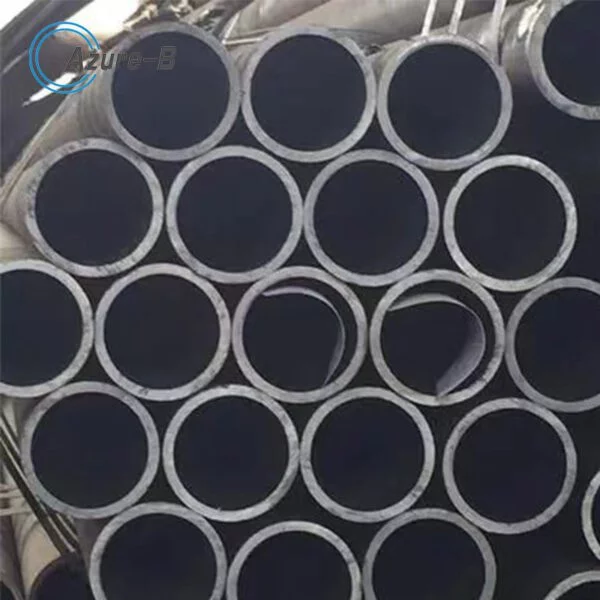Unlocking Superior Performance: Examining BS EN10297-1 Alloy Steel Tubes
Alloy steel tubes enable optimized mechanical properties for demanding industrial applications involving high temperatures, pressures, and corrosive conditions. Tailoring precise alloy combinations allows customization of strength, durability and functionality. BS EN10297-1 establishes vital specifications for seamless circular alloy steel tubes destined for pressure purposes across manufacturing, processing and power generation sectors.
BS EN10297-1 Alloy Tube
EN 10297 part 1 specifies the technical delivery conditions for seamless circular tubes made of non-alloy and alloy steels for mechanical and general engineering purposes.
Alloy special steel:41Cr4,25CrMo4,30CrMo4,34CrMo4,42CrMo4
OD: 20-660mm WT: 2.3-100mm L: 5.8M, 6M, 11.8M, 12M or any other specified length.
Application: Machining, General engineering, crane arm, Bushes, Cylinders Various, Conveyor Rolls, Hollow Shafts, Hollow Parts and components, Nuts, Rings, etc
This article provides comprehensive technical insight into BS EN10297-1. We analyze its scope, essential provisions, key alloy steel grades, principle applications and relationship to complementary standards. A detailed look at EN10297-1 facilitates informed alloy tube selection and quality assurance for boosting system safety and lifecycle ROI.
Overview and Scope
Initially published in 2003, BS EN10297-1 replaced national standards to unify European technical delivery requirements for seamless circular steel tubes used in pressure applications. It covers carbon, alloy and stainless steel grades used extensively in mechanical engineering. As an internationally adopted standard, EN10297-1 aims to consistently control steel quality, testing methods, inspection rules and documentation principles across EU member states to ease cross-border trade and technology transfer.
Core Provisions
BS EN10297-1 contains several key provisions that regulate alloy steel tube performance, quality and reliability:
-Chemical Composition Control ensures consistent alloy mixture percentages and limits impurities.
-Dimensional Tolerances maintain uniformity for tube diameters, lengths and wall thicknesses to enable interconnectivity.
-Testing Methods define procedures for tensile, flattening expansion, flange and other crucial performance validations.
-Surface Discontinuity Limits restrict imperfections to avoid crack propagation under pressure and loading.
-Mandatory Identification and Paperwork Traceability from raw materials to completed tubes.
Conforming with these vital benchmarks provides assurance of uniformity and dependability critical for pressure service.
Key Alloy Steel Grades
BS EN10297-1 covers a spectrum of alloy steels with optimized metallurgy for targeted environments:
-P235TR1 and P235TR2: Durable chromium-molybdenum alloys resisting creep and corrosion up to 400°C.
-13CrMo4-5: Creep resistant chrome-moly grades for elevated temperatures and pressures in steam boilers and pipelines.
-X8CrNiMoVNb9-1(Grade 353MA): Austenitic stainless steel retaining high ductility at extremely low cryogenic temperatures.
The standard facilitates matching the ideal alloy to individual temperature, pressure and fluid conditions for superior safety and economy.
Applications Across Sectors
The optimized and uniform alloy steel tubes under BS EN10297-1 provide versatile solutions for:
-Petrochemical Plants: Heat exchanger tubing and transfer piping handling corrosive hydrocarbons at extreme temperatures and pressures.
-Refineries: Crack-resistant piping for flammable fluids and high-pressure steam transportation.
-Power Plants: Durable heat exchanger tubing in nuclear facilities. Superheater and reheater tubing in coal boilers.
-Chemical Facilities: Non-reactive tubing containing hazardous reactants. Stainless tubes resisting corrosion.
Careful grade and size selection unlocks tremendous performance across industrial environments.
Links to Complementary Standards
While BS EN10297-1 governs critical chemistry, testing and inspection protocols, standards like EN 10216-5, ENISO 17945 and application-specific codes on boilers, pressure vessels etc. provide additional specifications to create integrated alloy steel systems:
-EN 10216-5: Steel tube dimensions and tolerances for precise sizing.
-ENISO 17945: Inspection documentation principles to confirm quality control.
-Industry Equipment Standards: Construction specs complementary to pipe material requirements.

Following the comprehensive suite transforms EN10297-1 tubes into long-lasting pressure boundary solutions.
In summary, understanding BS EN10297-1 allows harnessing the full technical and economic potential of optimized alloy steel tubes across demanding industrial environments for a competitive advantage. Matching tube grades and dimensions to individual process conditions ensures safe, reliable and efficient performance.

